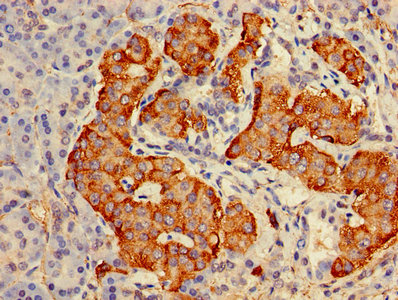
ICC/IF analysis of HeLa cells using GTX54161 GRP antibody. Blue : DAPI Dilution : 1:100
GRP antibody
GTX54161
ApplicationsImmunoFluorescence, Western Blot, ImmunoCytoChemistry
Product group Antibodies
ReactivityHuman, Mouse, Rat
TargetGRP
Overview
- SupplierGeneTex
- Product NameGRP antibody
- Delivery Days Customer7
- Application Supplier NoteWB: 1:500 - 1:2000. ICC/IF: 1:50 - 1:200. *Optimal dilutions/concentrations should be determined by the researcher.Not tested in other applications.
- ApplicationsImmunoFluorescence, Western Blot, ImmunoCytoChemistry
- CertificationResearch Use Only
- ClonalityPolyclonal
- Concentration1 mg/ml
- ConjugateUnconjugated
- Gene ID2922
- Target nameGRP
- Target descriptiongastrin releasing peptide
- Target synonymsBN, GRP-10, preproGRP, proGRP, gastrin-releasing peptide, bombesin, neuromedin C, pre-progastrin releasing peptide, prepro-GRP, testicular tissue protein Li 103
- HostRabbit
- IsotypeIgG
- Protein IDP07492
- Protein NameGastrin-releasing peptide
- Scientific DescriptionThis gene encodes a member of the bombesin-like family of gastrin-releasing peptides. The encoded preproprotein is proteolytically processed to generate two peptides, gastrin-releasing peptide and neuromedin-C. These peptides regulate numerous functions of the gastrointestinal and central nervous systems, including release of gastrointestinal hormones, smooth muscle cell contraction, and epithelial cell proliferation. These peptides are also likely to play a role in human cancers of the lung, colon, stomach, pancreas, breast, and prostate. Alternative splicing results in multiple transcript variants, at least one of which encodes a preproprotein that is proteolytically processed. [provided by RefSeq, Jan 2016]
- ReactivityHuman, Mouse, Rat
- Storage Instruction-20°C or -80°C,2°C to 8°C
- UNSPSC41116161






